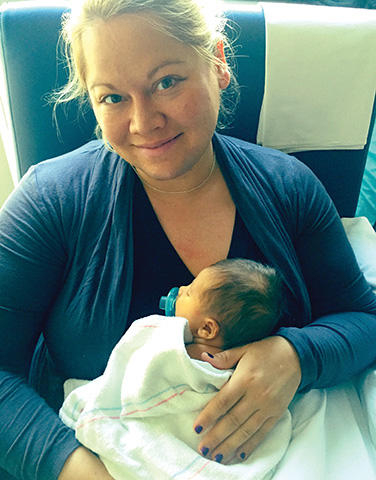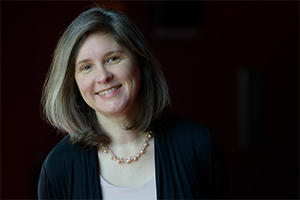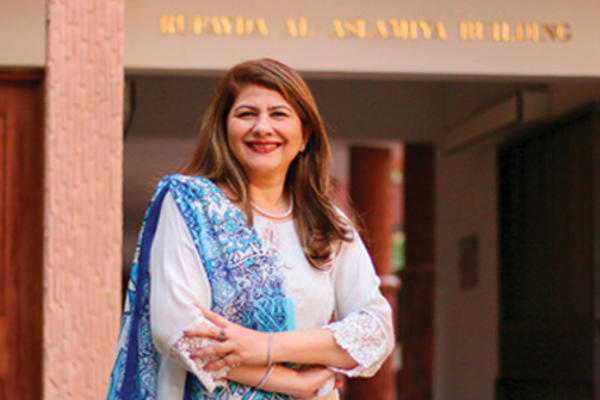Nourishing research
PhD student Kristin Elgersma sees a need for evidence-based care to support human milk and breastfeeding for infants with CHD
April 7, 2021
Brett Stursa
While congenital heart disease (CHD) is the most common congenital anomaly, affecting about 1 in 100 infants, it’s still a shock for parents to learn of the diagnosis.
Shortly after Kristin Elgersma gave birth to her son Inde in 2015, he was diagnosed with complex CHD and was taken to a NICU at a nearby hospital where he underwent open heart surgery.
Surgical outcomes for CHD have improved dramatically, which means infants with CHD are living longer and, increasingly, researchers and clinicians are looking for ways to support development. For babies like Inde, feeding can be a big area of concern.

The benefits of human milk are well known and are especially crucial for medically-vulnerable infants. “For babies with CHD, human milk has been shown to be a life-saving intervention,” says Elgersma, DM, MN, RN, a first-year student in the PhD program. However, research about human milk has not traditionally been translated into clinical practice, and some parents report that they don’t receive the support they need.
For Elgersma, direct breastfeeding was a significant challenge. “I was afraid to push it. I didn’t have an advocate and we were never able to establish a direct breastfeeding relationship, so I pumped for 11 months,” she says. “I was happy to be able to provide human milk for him, but I still feel that, with more support, he would have also been able to directly breastfeed.”
When he was 16 months old Inde underwent a planned surgery, but he died unexpectedly after postsurgical complications. “We were in the hospital for a long time, because he was on life support,” says Elgersma. “I really got to know the nurses, and I saw what they did. It was my first experience with high-level nursing. After he died, it solidified my desire to switch careers to nursing.”
Turning to research to make a difference
At the time she had her son, Elgersma was a professor of piano living in California. When she decided to commit to a career in nursing after his death, she enrolled in the University of Minnesota’s Master of Nursing program, which is a 16-month program for students with a prior degree in another field. As an MN student, Elgersma took a class with Assistant Professor Anne Chevalier McKechnie, PhD, RN, who has studied how parents prepare and learn to care for medically-fragile infants with aims to better support parents through the process.
After Elgersma graduated in 2018, she began working as a nurse interventionist and study coordinator on McKechnie’s research. “We work really well together,” says McKechnie. “We have kind of a unique relationship that began with being collaborators, and now we have the added academic mentor-mentee relationship.”
Their initial focus was developing and pilot testing a psychoeducational intervention, the Preparing Heart and Mind™ care program. The care program, which parents view as a mobile app, invites users to take in the amount of condition-specific information that they need and offers parent stories. As an eHealth enhanced platform, the parent-facing app and a clinician dashboard allow for closed loops of communication between the nurse and parents. The overall goal is to support parents’ mental health and promote their perceived caregiving competencies.
To build on her work with McKechnie, Elgersma enrolled in the School of Nursing’s PhD program, believing there is a need for evidence-based care to support human milk feeding and direct breastfeeding for infants with CHD. “Clearly it’s happening, but it’s not well represented in the literature, and there are no universal clinical guidelines to help providers support parents in this area,” she says. “Based on my own experience with my son, and from hearing the stories of other parents over the years, I felt like research was the way to go in terms of trying to make a difference in this area.”
First-of-its-kind study

Their results, which were published in Feeding Infants with Complex Congenital Heart Disease: A Modified Delphi Survey to Examine Potential Research and Practice Gaps in Cardiology in the Young, demonstrated overwhelming support for human milk as the preferred nutrition for infants with complex CHD, but discovered that management of a human milk diet is prone to clinical variation, with a lack of consensus about best practices.In 2019, McKechnie and Elgersma were awarded a University of Minnesota Office of Discovery and Translation (ODAT) grant to expand the existing Preparing Heart and Mind™ care program. As an initial step, they conducted a study examining clinical opinion on feeding practices for infants with complex CHD, the first of its kind.
The study helped inform the content for the research team’s new mobile app for parents, the Human Milk FeedingTM care program. Like the original Preparing Heart and Mind™, the program was developed through an industry partnership with GetWellNetwork, a patient engagement software company with a national and global reach.
Elgersma hopes that this new app can be helpful for other parents of an infant diagnosed with CHD. “I have heard from so many parents who have gone through the same feeding challenges that I went through with my son,” Elgersma says. “I would like to give these parents a voice and help create new knowledge about how parents’ feeding goals can best be supported, especially in regard to direct breastfeeding and human milk feeding.”
Learn more
To read Feeding Infants with Complex Congenital Heart Disease: A Modified Delphi Survey to Examine Potential Research and Practice Gaps in Cardiology in the Young, visit
https://z.umn.edu/feedinginfantswithcongenitalheartdisease.
Learn more about the GetWellNetwork by going to www.getwellnetwork.com.

